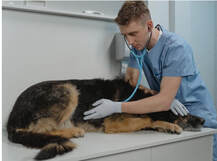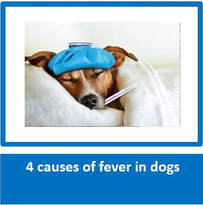
Please visit and LIKE / FOLLOW our Facebook Page and share with family, friends and on your own Facebook page, and ask them to share further – it is only by working together and sharing knowledge and education that we can improve the lives of dogs and assist owners. We do not inundate you with posts – an average of 5 per week, plus one Tip of the Week, and the odd informative post. Thank You!
4 Causes of fever in dogs!
Guest article by Lisa Greyson, an exceedingly talented content producer of all things pet-related. From pet care to pet love language, Lisa has found a sweet spot in the pet-pet owner relationship that she is exceedingly eager to share with you in her articles!
Please find more of them here www.thesouthafrican.com/author/lisa-greyson/

Dog fevers have various origins which may include inflammation, infection, immune issues, or connections to cancer.
Sometimes, the exact cause remains unclear. Here are a few.
1. Vaccines
Vaccinations are crucial for your dog’s health, enhancing his protection against harmful diseases.
They play a key role in your dog’s long-term well-being but can trigger minor, temporary side effects.
These side effects can include a fever because anything that activates the immune system may lead to one.
Fever after vaccinations is typically brief and not a big concern, usually not needing vet care.
However, if your dog seems very uncomfortable or the side effects persist for more than 24 hours, it’s best to consult your vet.
2. Infections
Infections, whether bacterial, fungal, or viral, can cause a fever in your dog. Any infection triggers an immune response, potentially resulting in a fever. Symptoms of infection can differ based on the specific type but often include lethargy, sneezing, coughing, or respiratory issues.
3. Sepsis
Sepsis happens when the body responds to an infection.
It’s an extreme reaction causing widespread inflammation and potentially organ failure.
This condition can rapidly become life-threatening.
If you think your dog might have sepsis, contact your vet right away; it’s a medical emergency.
4. Toxins
Dogs often have a knack for getting into things they shouldn’t.
This can result in a minor tummy upset or, at the worst, a toxic reaction.
Some things are a strict no-no for dogs, such as alcohol, chocolate, and onions.
If your dog ends up with a fever after eating something harmful, contact your vet or the local emergency clinic without delay.
If you can, take the label of the item your dog ingested with you. It helps the vet assess the issue’s seriousness.
Sometimes, the exact cause remains unclear. Here are a few.
1. Vaccines
Vaccinations are crucial for your dog’s health, enhancing his protection against harmful diseases.
They play a key role in your dog’s long-term well-being but can trigger minor, temporary side effects.
These side effects can include a fever because anything that activates the immune system may lead to one.
Fever after vaccinations is typically brief and not a big concern, usually not needing vet care.
However, if your dog seems very uncomfortable or the side effects persist for more than 24 hours, it’s best to consult your vet.
2. Infections
Infections, whether bacterial, fungal, or viral, can cause a fever in your dog. Any infection triggers an immune response, potentially resulting in a fever. Symptoms of infection can differ based on the specific type but often include lethargy, sneezing, coughing, or respiratory issues.
3. Sepsis
Sepsis happens when the body responds to an infection.
It’s an extreme reaction causing widespread inflammation and potentially organ failure.
This condition can rapidly become life-threatening.
If you think your dog might have sepsis, contact your vet right away; it’s a medical emergency.
4. Toxins
Dogs often have a knack for getting into things they shouldn’t.
This can result in a minor tummy upset or, at the worst, a toxic reaction.
Some things are a strict no-no for dogs, such as alcohol, chocolate, and onions.
If your dog ends up with a fever after eating something harmful, contact your vet or the local emergency clinic without delay.
If you can, take the label of the item your dog ingested with you. It helps the vet assess the issue’s seriousness.



